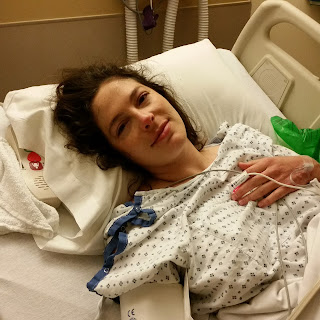During/Immediately Following Birth - What Medical Providers Need to Know (Part I)
A dear friend and
retired labor and delivery nurse asked me if I would be interested in speaking
at a local conference for midwives, obstetric, and neonatal nurses from a
mother's perspective. I told her yes and for the last several months have found
myself writing down a list of things I want medical providers to know when
interacting with families whose babies may die or are stillborn. These ideas
are from our experience and from speaking with other women who never brought
their children home. This post is the first of several.
 |
Immediately after my C-section.
I had no idea what the next 30 hours would hold
|
Here are some items medical providers need to know during and immediately following a C-section for a child who is taken to the NICU.
- Realize that parents likely have no frame of reference for a
C-section that leads to the NICU.
- People rarely go into labor expecting a C-section.
However, most women know C-sections happen. I remember attending a
"meet the midwives" session where a midwife mentioned
that about 8% of women in this hospital end up requiring a C-section. I looked around the
room and smugly thought, "Two or three of these women will need
C-sections. Sucks to them." Unexpectedly, I was one of those
suckers.
- When surgery is necessary, my mental references all involved smiling blue-gowned parents holding an infant with a drape in the background. I did not know that women could have a normal and healthy pregnancy, go into labor, need a cesarean, and the child goes to the NICU. In my limited experience, the NICU was for premature babies (preterm labor or twins/triplets), babies born to mothers on drugs, or babies with known genetic conditions.
- Show me my child!
- I never saw Isabella in the operating room. Apparently,
it is typical to show the baby to the mother, but she was so
unexpectedly sick that everyone forgot to let me see her. I texted my
husband several hours later and asked for a photograph of our girl.
- Even if it is just a quick glimpse as the baby is rushed
from the room, show the mother the child she has felt
moving for the last many months.
- If the child is in the NICU, have someone take a photo of the baby so the mom can see what her child looks like since one glimpse as her child is whisked away is not enough. (Ask before showing the photo.)
- Have someone stay with the mother for the duration of
surgery.
- We came to the hospital expecting I'd labor for several
hours. Eventually we'd cry tears of joy,
exhaustion, and wonder, taking turns holding and gazing at our precious girl.
- Instead, 38 minutes after I checked into the hospital,
my baby was delivered via emergency C-section. Isabella was immediately intubated and taken down to the NICU, accompanied by my husband. Then I was utterly
alone. I was strapped to the table, shaking from the anesthesia, knowing
something was horribly wrong with our daughter but not knowing what,
without my husband, without my baby,
and the entire surgery team was standing on the other side of a blue
sheet.
- Eventually, I called the nurse anesthetist to sit by me and talk while I was sewn up. It sounds like there is usually someone assigned to the mother. Make sure they know it is their sole job. If they are not doing it, have someone else know to be present with the mother.
- Again, we have no frame of reference for this type of
birth and don't know what to expect. My husband repeatedly asked the neonatologist, "When is the
skin-to-skin time?"
- The bulk of our C-section knowledge was from the childbirth
class. We were told that if the mother needed surgery, the baby would be handed
to the father for skin-to-skin time.
- Given this background, my husband expected to cradle our child on his chest. Thus, he repeatedly asked the doctor when he would get skin-to-skin time. In our case, never. No one told him, "Your daughter is very sick. We are going to do everything we can to save your daughter, but you will likely be unable to touch her for a long time."
- Be patient with us and remember that we had no idea our birth story would look so different than we expected.
- For the delivery team (nurses, doctors, midwife, techs, etc.), C-sections are an expected part of the job. For us, everything about the birth was off-script and terrifying.


Comments
Having you there for future births will be a tremendous blessing. I hope it is a joy, too, but we are all holding onto things loosely these days.